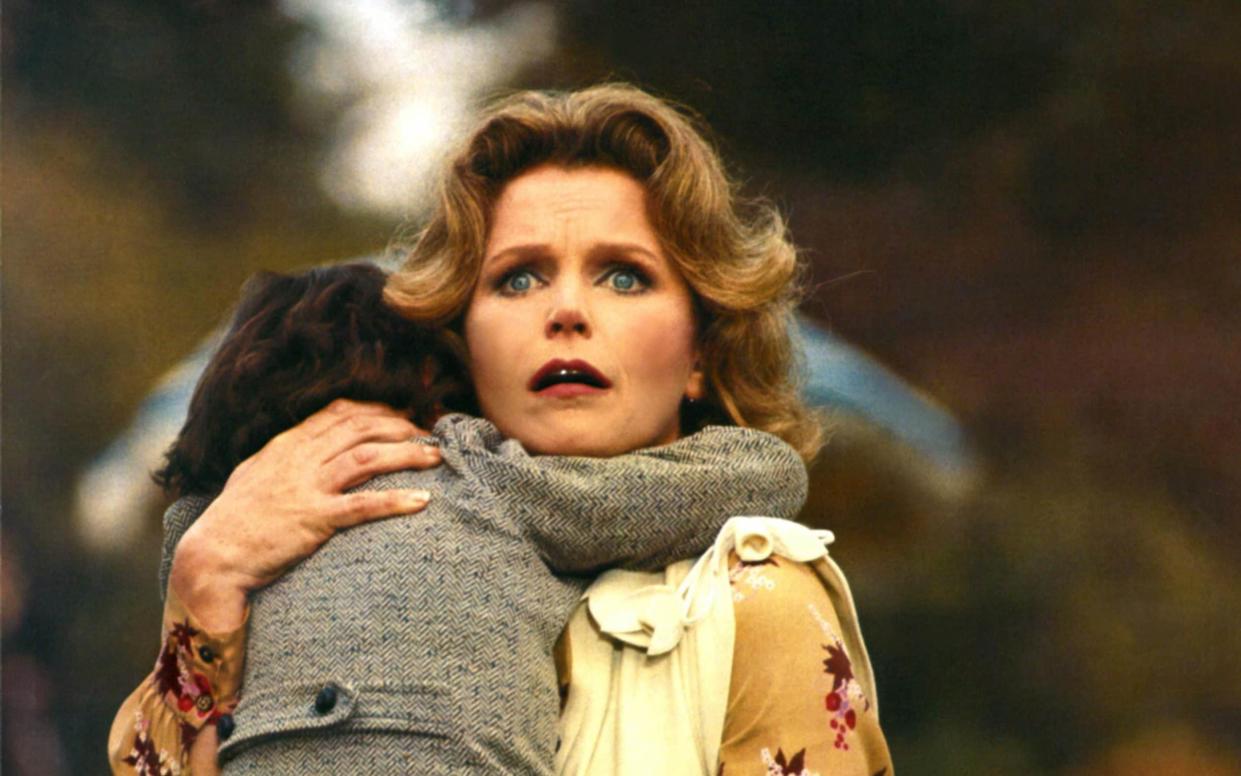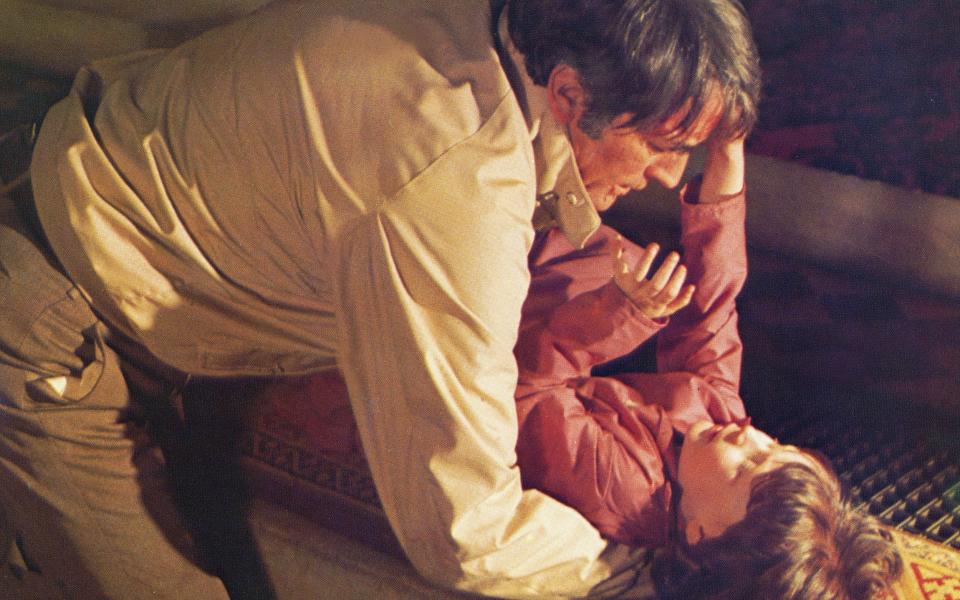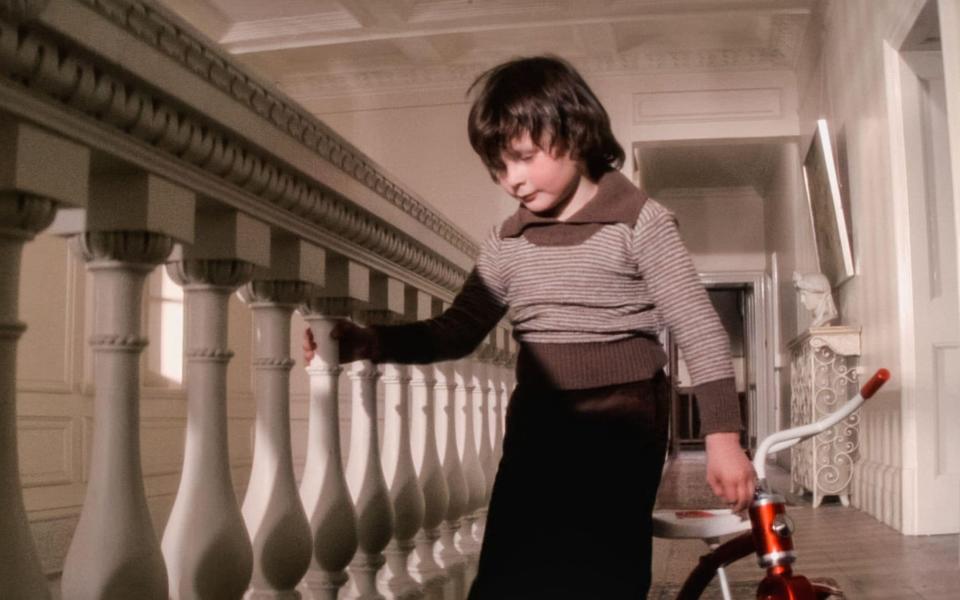Lightning strikes and decapitations: The ‘curse’ of the original Omen

- Oops!Something went wrong.Please try again later.
- Oops!Something went wrong.Please try again later.
- Oops!Something went wrong.Please try again later.
- Oops!Something went wrong.Please try again later.
Tales of cursed horror film sets are usually good for two things: headlines, and eye-rolling. When hundreds of people work on any given production, the fact of one or two dying, a year or three after it’s released, isn’t exactly hard evidence of Satan’s handiwork – but pretty handy PR when we’re trying to sell supernatural horror.
That said, the mad litany of coincidences that plagued The Omen – the 1976 horror hit about the second coming of the Antichrist which spawned three sequels, a 2006 remake, and now a prequel, The First Omen – are more likely to provoke stunned silence.
Let’s start in September 1975, when lightning struck a plane containing Gregory Peck, who was flying over to London to begin work on the film, in which he played a diplomat who adopts an unsettling child, Damien, after his wife suffers a stillbirth. The actor was grief-stricken at the time, after the suicide of his son Jonathan that June, when Peck was travelling in France. It’s been said that Peck, who had only made a couple of cheapo westerns in the first half of the 1970s, agreed to carry on with The Omen to work through his terrible feelings of paternal guilt.
A single lightning strike, causing no physical harm to anyone on board, is hardly much to write home about. Try a second: the executive producer, Mace Neufeld, was hit on his own transatlantic journey. He described it as “his roughest five minutes” ever on a plane. Now try a third: screenwriter David Seltzer’s plane was also struck as he headed over.
When filming shifted to Rome, the producer Harvey Bernhard narrowly avoided being blitzed by a lightning bolt on the street. For the rest of the shoot, he carried a cross at all times. “The devil was at work,” he would later explain, “and he didn’t want that film made.” For outing him as real, do we suppose, or exposing him to casual mockery?
All three of those planes may have landed safely, but the same was not true for a private jet they chartered, to get Peck to Israel for one of the film’s action scenes. When that sequence got delayed, the flight was scrapped. But chilling news awaited: the same plane, on the day Peck was due to fly, hit a flock of birds and crashed on a nearby road. Everyone on board was killed, along with three additional people who had the bad luck to be in a car it collided with. These three turned out to be the wife and two children of the man flying it.
Further freakish incidents broke out like a rash. Neufeld and Peck had a dinner reservation in London that was annulled when the restaurant was bombed by the IRA. So was the hotel that director Richard Donner was staying at, the day after they filmed the safari park scene.
That scene, at Longleat in Wiltshire, was traumatic enough for Lee Remick, whose car was surrounded by vicious baboons trying to rescue a convalescent alpha male that had been planted on the back seat to rile them up. They also hadn’t been fed. According to producer Mace Neufeld, Remick was “terrified.” All this required the services of one of the zoo’s animal handlers, who died the very next day (the same day as the hotel bombing) from a lion attack in the big cat enclosure.

Various other Omen curse stories have circulated over the years, with varying degrees of credibility and/or consistency. (For instance, some accounts say the zookeeper above was “eaten alive by tigers”; others that his death occurred a fortnight later.) One especially grisly, well-attested fatality lay in wait for a special effects assistant called Liz Moore. She hadn’t been employed on The Omen – but her boyfriend John Richardson had. Afterwards, they were both contracted in Holland in August 1976 (two months after The Omen’s release) to work on Richard Attenborough’s war epic A Bridge Too Far (1977).
Richardson was driving his BMW when the pair were involved in a horrifying crash, causing Moore to be decapitated by a flying tyre. Flashbacks to the famous Omen set-piece Richardson had very skilfully orchestrated, with David Warner’s head being lopped off by a pane of glass, were impossible for him to avoid. The story goes – and here, gets stupid – that Richardson came to, saw Moore severed in the wreckage, and noticed a nearby road sign reading “Ommen, 66.6km”. This part is easily disproved: distance markers in Holland do not have decimal points.
These urges to embellish “cursed film” sagas with added fake news routinely tip them into absurdity. But jerry-rigging the idea of an Omen curse strangely suits this particular film’s whole vibe: calculated hokum. Seltzer, the man hired by 21st Century Fox in 1973 to cook up the whole thing, was honest about his motives: “I did it strictly for the money,” he once confessed. “I was flat broke. I just wish I’d had this kind of success with something I personally found more meaningful.”

Nor was it even a top-drawer production – quite visibly so. The $2.8m it cost was chump change for 1976, if you compare The Exorcist (1973, $12m) or, indeed, the blockbuster expense of Donner’s next film, Superman (1978, $55m). Money was so tight that Richardson was hauled over the coals by 20th Century Fox for exceeding his effects budget by £1,000.
What arguably saved the whole film was the score. Jerry Goldsmith was struggling for ideas on the music, until one evening, he suddenly announced to his wife, “I hear voices!”. So, after a few conversations with a London choirmaster, his wonderfully deranged Black Mass of a soundtrack was born, with its inversion of Latin phrases to create a kind of Satanic version of Gregorian chant.
Latin, to be fair, was not Goldsmith’s particular specialism: the grammar of his much-repeated lyrics would, from the very first words, be an instant GCSE fail. (“Sanguis bibimus”?!). The score, though, is tremendously effective on every other level. It won the composer his only Oscar, from a total of 18 nominations across his career; he was also nominated for Best Original Song, for the main theme, “Ave Satani”, but lost to Barbra Streisand’s “Evergreen” from A Star is Born.
Because of the intense chanting, it’s mistakenly assumed that Carl Orff’s Carmina Burana must have informed Goldsmith to some great degree. Outrageously, Orff’s “Oh Fortuna!” has even been known to appear on cash-in compilations, which claim it’s a cue from The Omen’s score.
The stabbing rhythms are much more Stravinsky-ish than Orff-esque, anyway. The instrumentation, including electronic touches for the Rottweilers, is pure Goldsmith. And the sum of it generates maybe 90 per cent of the film’s suspense. Try to imagine a music-free version of the storm sequence when Troughton’s priest meets his fate: without Goldsmith’s oomph, it’s a nothing. Meanwhile, I challenge anyone to listen to the thunderous last minute of his longest cue, “The Dogs Attack”, without wanting to slice through the air with an imaginary baton. It’s bloodcurdling stuff.
Goldsmith would sign back on for the second and third films in the trilogy and elevate them as best he could: they do have their moments. Curiously, they also persuaded William Holden to star in the second one, Damien: Omen II (1978), even though he’d originally rejected Peck’s role, on the basis that he didn’t want to make a film about the Devil. Perhaps the sequel being a guaranteed hit on twice the budget had a way of scotching Holden’s misgivings. He certainly can’t have been superstitious.
The First Omen is out on Friday

